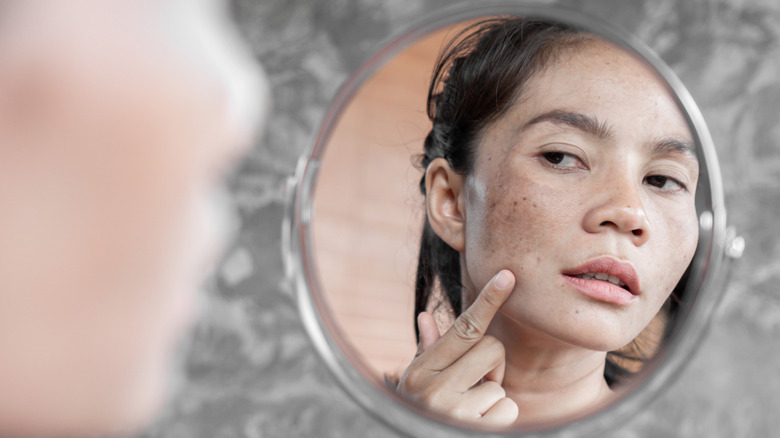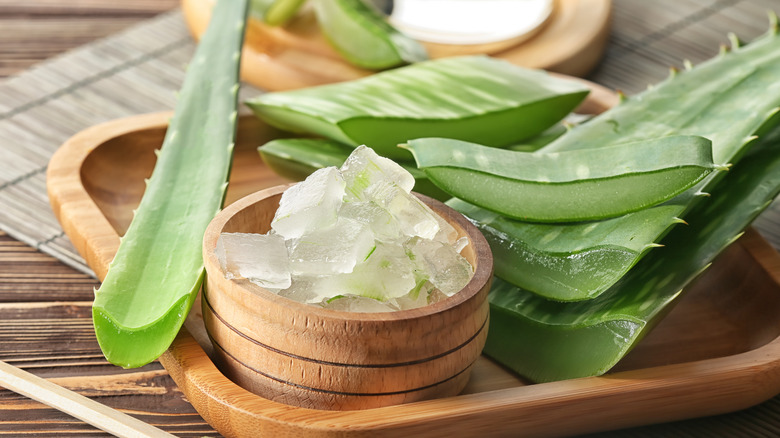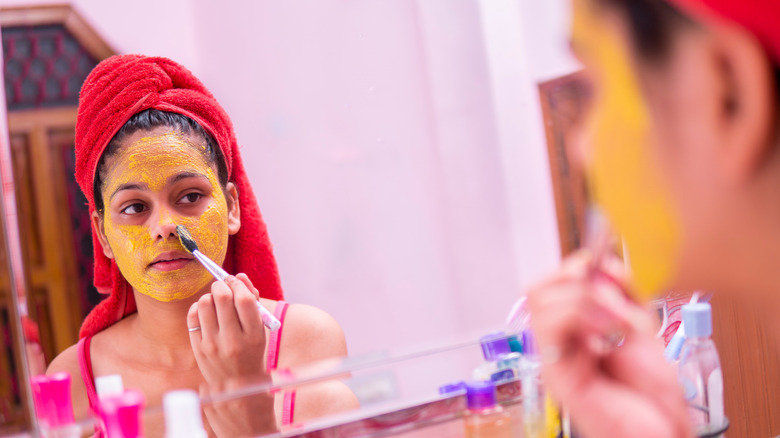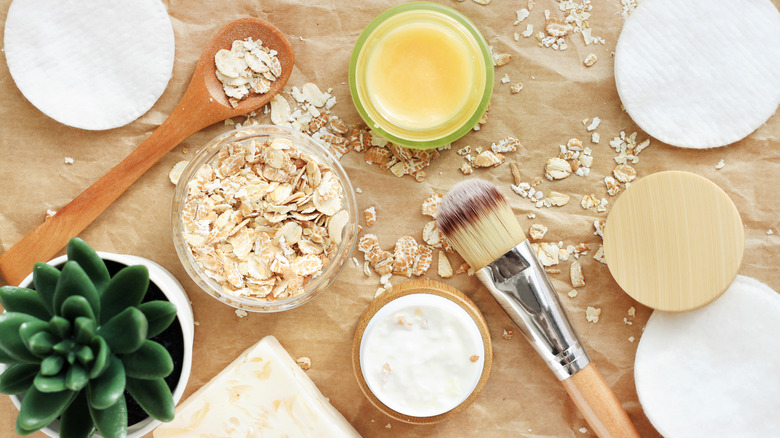Natural And Gentle Home Remedies For Dark Spots
Finding the best home remedies for dark spots isn't easy, as this condition can have a multitude of causes. Age spots, for example, may require a different approach than sunspots. "If you can eliminate the cause, many spots will clear on their own and you can prevent new ones from appearing," points out the American Academy of Dermatology Association (AAD).
Hyperpigmentation, or dark spots, can be due to pimples, hormonal fluctuations, skin injuries, or certain medications. Sometimes, it's triggered by skin or hair care products, notes the AAD. If, say, you have acne-related dark spots, then you first need to treat the acne. Chances are, most dark spots will disappear on their own. This process can take anywhere between six months and several years, depending on the cause.
The AAD advises against using many skin-lightening products. These creams and serums may contain mercury, steroids, and other harsh ingredients that affect skin health. Steroids, for example, can cause local reactions or even permanent discoloration. Considering these risks, it makes sense to try some natural home remedies for dark spots before resorting to more invasive treatments. The question is, what should you use to minimize the risk of side effects and achieve better-looking skin? Let's find out.
Aloe vera might be one of the best home remedies for dark spots
Rich in vitamins, minerals, amino acids, and antioxidants, aloe vera is often recommended for at-home skincare. When used topically, it can speed up wound healing, reduce inflammation, and slow down aging (via the Indian Journal of Dermatology). While studies are needed to confirm its benefits, this plant is relatively safe and has fewer side effects than conventional treatments.
In a clinical trial, people who applied aloesin on the affected areas four times a day for 15 weeks showed 34% less pigmentation than the control group, reports Clinical and Experimental Dermatology. Aloesin is a naturally occurring skin-lightening agent in aloe vera. Its effects are dose-dependent, according to the above study. Clinical evidence also indicates that aloesin may suppress melanin production in the skin, preventing dark spots (per the International Journal of Cosmetic Science).
To reap the benefits, you'll need to extract aloe vera gel from the plant. Simply cut off a thick leaf near to the root, rinse it, and then gently pat it with a towel. Remove the prickly parts and check for signs of mold. Use a knife or spoon to scoop the gel out. Cut the gel into small pieces and freeze it or store it in the fridge, per MindBodyGreen. Apply a small amount on your wrist to test for allergic reactions. If everything looks fine, apply the gel to your face and massage it into the skin. Repeat several times a day.
Make a turmeric face mask to even your skin tone
Another popular home remedy for dark spots is turmeric. Curcumin, its active compound, inhibits melanin synthesis by activating several signaling pathways, explains a 2012 review published in Phytotherapy Research. Melanin is a natural pigment that gives color to your skin, hair, and eyes (via WebMD). Turmeric interferes with your body's ability to produce this pigment, which in turn may help reduce dark spots.
As dermatologist Joshua Zeichner told Marie Claire, "[Turmeric] is an ideal type of treatment for anyone, but especially if you're dealing with acne, since it can calm inflammation, kill microorganisms on the skin, and fade dark spots." He also recommends it as a natural remedy for wrinkles and fine lines.
Marie Claire suggests combining 1/4 teaspoon of turmeric powder, 1 tablespoon of yogurt, and 1/2 tablespoon of raw honey in a small bowl. Stir well and then apply a tiny amount to your arm. If there are no signs of an allergic reaction over the next 24 hours, go ahead and use it on the affected areas.
Natural remedies are not always safe or effective
Green tea, mulberry, soy, and arbutin are all used as natural home remedies for dark spots. These ingredients may benefit those with hyperpigmentation disorders, but the research is limited. Most studies that tested their efficacy were either small or of short duration (per the Journal of Clinical and Aesthetic Dermatology). Also, keep in mind that "natural" doesn't equal "safe."
Lemon juice, for juice, can affect your skin's pH balance due to its high acidity, notes Medical News Today. When applied to the skin, it may lower its pH levels and cause irritation. On top of that, it can worsen the appearance of dark spots.
The American Academy of Dermatology Association recommends applying sunscreen daily, including in the winter months, to prevent further darkening of the spots on your skin. Ideally, look for products with a sun protection factor (SPF) of 30 and up. The AAD also suggests using a quality cream or serum containing vitamin C, retinoids, glycolic acid, or azelaic acid. You may also choose one with no more than 2% hydroquinone, an organic compound that bleaches the skin. To stay on the safe side, discuss your options with a dermatologist.



